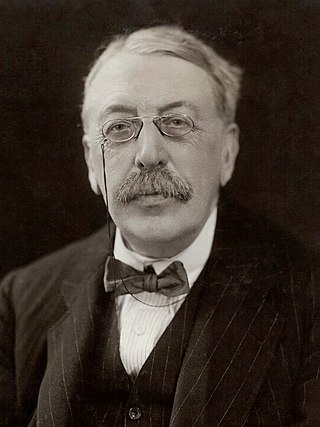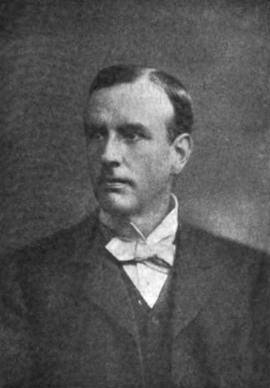Background
In the mid 1880s, Parry was struggling to establish himself as a composer. In 1886, he was disappointed when his one attempt at opera, Guenever, was rejected by the impresario Carl Rosa. [2] Shortly after that setback, Parry was commissioned by Charles Villiers Stanford to compose a piece for the Bach Choir of London, of which Parry was a member. [3] Stanford, one of the first British musicians to recognise Parry's talent, called him the greatest English composer since Purcell. [4]
Stanford had originally intended to perform an existing work of Parry's, the 1885 cantata The Glories of our Blood and State. As the concert was to mark the Golden Jubilee of Queen Victoria, it was thought that such lines in the text as "Sceptre and crown must tumble down" made the work unsuitable for the occasion. [3] Asked to write a new piece, Parry turned, at the suggestion of his colleague George Grove, to Milton's ode, which he had been considering setting for many years. [5]
The main item in the concert was the first London performance of Hector Berlioz's Te Deum (1849), dedicated to the queen's late husband, Albert, Prince Consort. Berlioz's work is on an enormous scale, and would have overshadowed any companion piece other than one of the highest quality. [6] Reviewing the concert, The Times said of Blest Pair of Sirens:
The choral writing is in eight parts and abounds in contrapuntal devices. At the same time the spirit and the accent of the words are carefully attended to, as befits a work in which "sphere-born harmonious sisters, voice and verse" are invoked to "wed their divine sounds, and mix'd power employ". An excellent rendering contributed to the brilliant success of the ode. [6]
The work was an immediate success, and was quickly taken up by other choirs. The following year it was given alongside Sullivan's The Golden Legend at the Three Choirs Festival. [7] Recognised as "one of the outstanding English choral works", [3] the work has remained a standard in the choral repertory. Among its higher-profile performances in the 21st century were those by BBC forces at the Last Night of the Proms in September 2010, [n 1] and by the choirs of Westminster Abbey and the Chapel Royal at the wedding of the Duke and Duchess of Cambridge in April 2011. [9]

Sir Charles Hubert Hastings Parry, 1st Baronet, was an English composer, teacher and historian of music. Born in Richmond Hill in Bournemouth, Parry's first major works appeared in 1880. As a composer he is best known for the choral song "Jerusalem", his 1902 setting for the coronation anthem "I was glad", the choral and orchestral ode Blest Pair of Sirens, and the hymn tune "Repton", which sets the words "Dear Lord and Father of Mankind". His orchestral works include five symphonies and a set of Symphonic Variations. He also composed the music for Ode to Newfoundland, the Newfoundland and Labrador provincial anthem.

Sir Henry Walford Davies was an English composer, organist, and educator who held the title Master of the King's Music from 1934 until 1941. He served with the Royal Air Force during the First World War, during which he composed the Royal Air Force March Past, and was music adviser to the British Broadcasting Corporation, for whom he gave commended talks on music between 1924 and 1941.

Sir Charles Villiers Stanford was an Anglo-Irish composer, music teacher, and conductor of the late Romantic era. Born to a well-off and highly musical family in Dublin, Stanford was educated at the University of Cambridge before studying music in Leipzig and Berlin. He was instrumental in raising the status of the Cambridge University Musical Society, attracting international stars to perform with it.

The Te Deum by Hector Berlioz (1803–1869) was completed in 1849. Like the earlier and more famous Grande Messe des Morts, it is one of the works referred to by Berlioz in his Memoirs as "the enormous compositions which some critics have called architectural or monumental music." While the orchestral forces required for the Te Deum are not as titanic as those of the Requiem, the work calls for an organ that can compete on equal terms with the rest of the orchestra. It lasts approximately fifty minutes and derives its text from the traditional Latin Te Deum, although Berlioz changed the word order for dramatic purposes.

Alan Gray was an English organist and composer.
The Choir of Trinity College, Cambridge is a mixed choir whose primary function is to sing choral services in the Tudor chapel of Trinity College, Cambridge. In January 2011, Gramophone named the choir the fifth best choir in the world.
Saint Peter's Singers (SPS) is a chamber choir associated with Leeds Minster, Leeds, West Yorkshire, England that celebrated during the Season 2017/2018 the fortieth anniversary of the choir's formation by Harry Fearnley in 1977. An anniversary concert took place at Leeds Minster on Sunday 25 June 2017 with the National Festival Orchestra and soloists Kristina James, Joanna Gamble, Paul Dutton and Quentin Brown. Further anniversary year events included Bach Cantatas and Music for Christmas at Fulneck Church in August and December respectively, Handel Coronation Anthems at Holy Trinity, Boar Lane as part of the Leeds Handel Festival in September and a tour of East Anglia in October. In November at Leeds Town Hall, the Singers participated in Herbert Howells's masterpiece Hymnus Paradisi with Leeds Philharmonic Chorus and Leeds College of Music Chorale under the direction of Dr David Hill with the Orchestra of Opera North. 2018 began with a concert of Sacred Choral Masterworks at Leeds Town Hall in February and Bach's Mass in B minor at Leeds Minster on Good Friday 2018 in memory of long-serving member Jan Holdstock. The final concert of the current season takes place at Leeds Minster on Sunday 24 June at Leeds Minster at 5.30. At this event will be presented the first performance of a new work from composer Philip Moore commissioned for the Singers' 40th anniversary – the motet Tu es Petrus – along with music by E W Naylor, Arvo Part, Sir Hubert Parry, Judith Bingham and Maurice Durufle.
The Bach Choir is a large independent musical organisation founded in London, England in 1876 to give the first performance of J. S. Bach's Mass in B minor in Britain.
The Southampton Philharmonic Choir is a large choral society based in Southampton, England. It has around 170 members and also benefits from collaborating with the students of the Southampton University Philharmonic Choir. The choir regularly performs with a professional orchestra, the New London Sinfonia, and is directed by David Gibson.

Charles James Kennedy Osborne Scott was an English organist and choral conductor who played an important part in developing the performance of choral and polyphonic music in England, especially of early and modern English music.

Utrecht Te Deum and Jubilate is the common name for a sacred choral composition in two parts, written by George Frideric Handel to celebrate the Treaty of Utrecht, which established the Peace of Utrecht in 1713, ending the War of the Spanish Succession. He composed a Te Deum, HWV 278, and a Jubilate Deo, HWV 279. The combination of the two texts in English follows earlier models. The official premiere of the work was on 13 July 1713 in a service in St Paul's Cathedral in London.
The Elegy for Brahms is a short symphonic movement for orchestra, written by Hubert Parry in 1897. It was written shortly after the death of Johannes Brahms, whom Parry considered the greatest artist of the time.
The Bearsden Choir is a choir of 120 mixed adult voices based in Glasgow, Scotland. It was formed in 1968 and performs both sacred and secular classical choral works. The singer Jamie MacDougall is its Honorary President.

The Te Deum in C is a sacred choral composition by Benjamin Britten, a setting of the Te Deum on the English text from the Book of Common Prayer. Britten wrote it in 1934 between 11 July and 17 September, scored for treble solo, four-part choir (SATB) and organ.
Daniel Cook is an organist, conductor and singer. Since Autumn 2017 he has been Master of the Choristers and Organist at Durham Cathedral.

Three Latin Motets, Op. 38, is a collection of three sacred motets based on Latin texts for mixed unaccompanied choir by Charles Villiers Stanford, comprising Justorum animae, Coelos ascendit hodie and Beati quorum via. The texts come from different sources, and the scoring is for four to eight parts. They were published by Boosey & Co in 1905. The works, some of Stanford's few settings of church music in Latin, have remained in the choral repertoire internationally and are performed in liturgies and concert.

The Service in B-flat major, Op. 10, is a collection of Anglican church music by Charles Villiers Stanford for mixed choir and organ containing the canticles for each of the principal services of the Anglican Church. Stanford set the traditional liturgical texts in English in 1879 when he was the organist of Trinity College, Cambridge. They were published by Novello in 1902. Stanford orchestrated the work in 1903, with additional organ.
Songs of Farewell is a set of six choral motets by the British composer Hubert Parry. The pieces were composed between 1916 and 1918 and were among his last compositions before his death.

The Queen's Platinum Jubilee Concert was an Australian concert held on 6 August 2022 at St John's Cathedral, Brisbane that celebrated the Platinum Jubilee of Elizabeth II, Queen of Australia. The concert was directed by composer Alexander Voltz and organist Andrej Kouznetsov.










